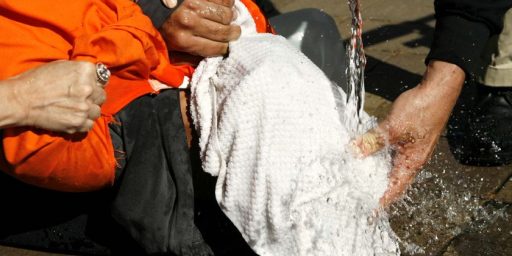The Libertarian Argument Against Torture
In a recent post I missed until seeing it linked by Andrew Sullivan, Radley Balko recants his previous position in support of torturing suspected terrorists. His new position is more-or-less what mine has been all along, but then I’m about a decade older than he is and have been thinking about this sort of thing professionally for over twenty years, going back to my cadet days.
Still, he offers the most concise libertarian critique of torture I’ve seen:
I should have opposed torture for the same reason I oppose just about every other surrender of power to the government that naive people (in this case, like me) tend to think looks good on paper: Because the government won’t use it competently, because the government will abuse it, and because the government will find new, inappropriate contexts in which to use it.
Indeed, it stands without the introductory material preceding the colon, which I provide only for context. Yes, it’s essentially the libertarian critique of everything. Still, it’s an excellent default position.






But, as Balko himself demonstrates over time, it’s a lot easier to maintain ones high-minded principles, when one isn’t under attack.
What Balko’s recanting doesn’t account for, aside from the issue of “principle” while under attack, is that defense is one of the very few illegitimate purposes of government.
(And in the case of the united states is so recognized by the constitution )
Finally, we are still left with the issue of what constitutes “torture”. As an example; what those fifteen sailors from Britain are undergoing, would, a few months ago, have been considered “torture” by our press. But since at this point, it is the Iranians dishing it out, the word “torture” has not much as darkened a page in our press. (Telling, that)
Forgive me, James, and with all respect to you, but as a result of these lines of thought, I find it most difficult to get wrapped up in this moralizing.
Finally, we are still left with the issue of what constitutes “tortureâ€. As an example; what those fifteen sailors from Britain are undergoing, would, a few months ago, have been considered “torture†by our press. But since at this point, it is the Iranians dishing it out, the word “torture†has not much as darkened a page in our press. (Telling, that)
Umm…. are you serious? Because it’s been brought up in most of the articles that I’ve been reading. While the word torture isn’t always used, the statements of the British sailors are almost always referred to having most likely been coerced or made under duress.
duress = force = torture
coercion != force != torture
Coercion can but doesn’t necessarily mean while under duress or by force.
In my view, when a journalist uses the term coercion they are probably being deliberately obtuse.
“Coercion” is a handy journalistic weasel-word.
I wish Lunacy [sic] had explained how to coerce someone without duress or force of some sort. I would probably find that a handy interpersonal skill. Does it involve ESP?
How about this tactic, used at Gitmo on a 9/11 suspect?
On Aug. 2, an interrogation chief visited the prisoner posing as a White House representative named “Navy Capt. Collins,” the report said. He gave the prisoner a forged memorandum indicating that Mr. Slahi’s mother was being shipped to Guantanamo, and that officials had concerns about her safety as the only woman amid hundreds of male prisoners, according a person familiar with the matter.
“Capt. Collins” told Mr. Slahi “that if he wanted to help his family he should tell them everything they wanted to know,” the report continued.
Duress? Force? Or just wholesome, all-American coercion?
(Remarkable article, btw, on an Army prosecutor who refused to proceed against a prisoner who’d been tortured & abused.)
Well, I tend to fall back on a more golden-rule-style definition of torture: what treatment would outrage us if it were used on our own people? We shoudn’t treat other people that way, Geneva Conventions or not.
Unfortunately, that renders many news accounts unhelpful in determining if what’s going on in a given case is ‘torture’ or ‘coercion’, but I think it’s a necessary first step to get a more widely-agreed-upon definition…
e gave the prisoner a forged memorandum indicating that Mr. Slahi’s mother was being shipped to Guantanamo, and that officials had concerns about her safety
Of course, we use coercion on our own criminal suspects on levels not far below that.
Of course, we use coercion on our own criminal suspects on levels not far below that.
And that’s actually fairly mild compared to the other stuff that was reported. If that were the worst we did, I doubt it would be a scandal.
But pretty obviously, threatening to have one’s mother imprisoned & abused is both wrong & counterproductive. What would a guy *not* confess to, to keep his mom or kids safe?
Police interrogation & abuse is of course an often-detailed subject in America (see “the third degree”). It does get confessions — that’s the idea. Whether the right person is confessing … not so important.
I don’t disagree that our government shouldn’t engage in torture, but the problem is (as it has been from the beginning) what constitute’s torture?
Andrew Sullivan’s definition of torture is assuredly different than mine.
Also, Balko’s position on the war on terror in general is pretty absurd. He’s written posts in the past where he contends that we should treat terrorist attacks as though they were hurricanes. Just events that we cannot stop or control. Events that we should just try to clean up after they happen.
Which is a disgusting point of view to have, to my mind. We’ll never be able to protect ourselves fully from terrorist attacks, but there is a great deal we can do to minimize the possibility that they’ll happen.
Abdicating our responsibility to do what we can to stop and/or minimize the threat of terrorism is just plain immoral, in my book. Much more immoral than any of the “torture” Balko is outraged about.
Police interrogation & abuse is of course an often-detailed subject in America (see “the third degreeâ€). It does get confessions — that’s the idea. Whether the right person is confessing … not so important.
Anderson – Well put. One of the most criminally underreported stories about our criminal justice system is the sheer number of false confessions that are made every day, whether it be through coercive interrogations, or the police out and out lying about the type of evidence they have in order to obtain a confession and/or a plea bargain. (Murder suspects will be told, for example, that their fingerprints are on the murder weapon so they should plea out when, in fact, the murder weapon hasn’t even been found. Who wouldn’t try to plea to a lesser sentence in those circumstances?)
Our whole justice system, not to mention our system for counterterrorism operations, is far less concerned with actually stopping crime or terrorism and far more concerned with making it LOOK LIKE they’re stopping crime or terrorism by “acting tough.”
but the problem is (as it has been from the beginning) what constitute’s torture?
If only someone had thought of this … oh, wait:
For the purposes of this Convention, the term “torture” means any act by which severe pain or suffering, whether physical or mental, is intentionally inflicted on a person for such purposes as obtaining from him or a third person information or a confession, punishing him for an act he or a third person has committed or is suspected of having committed, or intimidating or coercing him or a third person, or for any reason based on discrimination of any kind, when such pain or suffering is inflicted by or at the instigation of or with the consent or acquiescence of a public official or other person acting in an official capacity. It does not include pain or suffering arising only from, inherent in or incidental to lawful sanctions.
According to the WSJ article I linked, The 1994 federal statute implementing the treaty contains additional definitions, including the “threat of imminent death” or “severe physical pain or suffering,” as well as the actual or threatened use of “mind-altering substances or other procedures calculated to disrupt profoundly the senses or the personality.
Geneva, I believe, also covers abusive treatment. Beating & waterboarding obviously fall within the UN Convention, however.
Websters definition 2 of “coerce”
2 : to compel to an act or choice
Websters definition 1 & 2 of “compel”
1 : to drive or urge forcefully or irresistibly
2 : to cause to do or occur by overwhelming pressure
Neither of these necessarily translate to “torture”.
They CAN be torture as a rectangle CAN be a square. But, obviously the square is not necessarily a rectangle.
To me it is weaslie to use a term that CAN be ambiguous when there are many words out there that aren’t.
Lunacy
I’m posting the definition of coerce and compel again because my cut and paste characters hid the examples with the little pointy symbol that is the shift-period/shirt/comma.
Coerce:
2 : to compel to an act or choice –was coerced into agreeing–
Compel:
1 : to drive or urge forcefully or irresistibly –hunger compelled him to eat–
2 : to cause to do or occur by overwhelming pressure –public opinion compelled her to sign the bill–
Yes, Alex, I’m quite serious.
What, after all, is SPIN but carefully chosen words.. what gets said and what does not, to create a particular perception on the part of the listener/reader?
Lunacy, I agree that “coercion” is weaselly — as I said above — but in the context of interrogation, I’m not sure how “coercion” means anything other than duress or force (threatened or applied).
Which may be a hole in the UN Convention, now that I think of it. Most victims of the Inquisition, IIRC, confessed upon being merely shown the instruments of torture; that was so effective that it was the first step in the handbook.
I don’t know where people like Bitman have put there moral compasses. You can be certain they had them once, like during the Vietnam and cold war. The tactics our present administration is employing were once used by both the Viet gong and KGB. The idea of a US soldier being water boarded by an enemy would have sent Bitman’s compass whirling but not now. An American citizen being subjected to 55 straight days of sleep deprivation would have rightly had him screaming for justice and worldwide condemnation. Now it all depends on what you mean by water boarding. Is sleep deprivation really torture? The fact that a majority of those held at Gitmo, and this according to many of those who guard them, are in all likelihood innocent and handed over to US troops by warlords for bounties is of no interest to those who continue to support Bush no matter what.
Not only is torture being used legally in our country today, its being used as punishment and not for information.
Alone, my morality is doing just fine, thank you.
But, tell me something; is not survival the first thing? Survival as a people, as well as survival as individuals…
If we give that up, and we give up control of the situation, what good is any of the rest of it? What possibility do any of those “high ideals” we hold, have, to survive in the world? If we are unwilling to do what’s necessary defend ourselves by whatever means, then what it comes down to is we don’t deserve to survive.
Which, seems rather handy, since we probably won’t.
Survival is the highest priority, my friend. Everything else is secondary to that ideal, since everything else you hold dear DEPENDS on it.
The winners, you see, are the ones who get to decide what constitutes morality… and they won’t pay what YOU or I consider moral, any mind whatever… as they have repeatedly demonstrated.
Ah, so you really think it didn’t happen? Indeed, I would defy you to tell me in what war in this nation’s entire history, the conventions were followed by those we were fighting.
You can’t… they never were.
You can’t… they never were.
Our forefathers … such suckers!
Perhaps you’ll recall that the British considered that wer were not fighting the Revolution accoring the the laws of civilised warfare, and thought the American army a band of guerrillas?